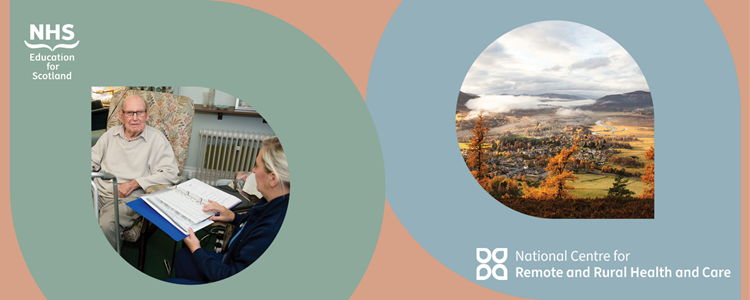Research and Evaluation Projects

Research and Evaluation Projects
Our team of research and evaluation specialists within NES/the National Centre also undertake focused projects that aim to increase the remote, rural and island health evidence base for Scotland.
We are committed to identifying and developing models of excellence within the Scottish rural healthcare system. We aim for the outputs of our research and evaluation to be useful to the improvement of recruitment, retention and the sustainability of rural health services.
Research and evaluation and the information they generate can empower practitioners and clinicians in rural areas. Outputs such as evidence-based insights can inform decision-making, enhance service delivery, and promote sustainable healthcare solutions tailored to their unique contexts. The knowledge and learning gained from research and evaluation can support clinicians and practitioners in rural areas to implement best practices and interventions and innovate solutions tailored to their communities' specific needs.
We aim to increase awareness within Scotland of international models for implementation and evaluation within remote, rural or island areas. Our work also aims to help improve service users’ access and address rural health inequalities.
Some key research and evaluation topics include:
- access to healthcare services (barriers, gaps, and solutions)
- health inequalities (urban/rural, social determinants, intervention efficacy)
- workforce issues (recruitment, retention, impact of training)
There are several research and evaluation projects underway, including:
Development of an Evaluation Framework for the Making it Work Framework
The Making it Work Framework is a key recruitment and retention tool for remote, rural and island Scotland. We are working with key NHS and community stakeholders to develop an adaptable evaluation framework that will help implement one of the five key drivers of successful recruitment and retention: ‘monitoring and evaluation’. The evaluation framework, co-designed with local stakeholders, is structured around core metrics to track and enhance recruitment and retention outcomes. Key measures include effectiveness, impact, efficiency, relevance and sustainability.
Making it Work may serve as a valuable framework for evaluating other recruitment and schemes in rural Scotland by providing insights into good practice, common challenges, and tailored approaches that can be adapted to assess similar initiatives.
Evaluating rural recruitment and retention initiatives in Scotland is beneficial because it can provide evidence-based insights into what strategies are most effective, support the development of sustainable workforce solutions, and ultimately help reduce healthcare disparities in remote and rural areas.
NHS Highland Skye Recruitment Group Evaluation Framework | Turas | Learn
Supporting our GP Workforce Qualitative Study
This study focuses on workload management, reducing intention to leave, and creating protected time for GPs. A questionnaire has been developed with input from the Rural GP Association of Scotland (RGPAS) and will be distributed to rural GP colleagues in November and December 2024. Our goal is to identify key areas for improvement that can lead to lasting solutions in rural primary care.
By addressing workload and retention challenges, this GP workforce study aims to inform policies that ensure GPs in rural settings have the support they need to continue providing high-quality care. This project responds to the Royal College of General Practitioners’ (RCGP) “Retaining Our GP Workforce in Scotland” recommendations, offering deeper insight into how these issues manifest in remote, rural, and island settings. The findings may contribute to actionable strategies that aim to reduce burnout and improve job satisfaction among rural GPs, ultimately leading to more sustainable healthcare services.
Supporting our GP Workforce Qualitative Study | Turas | Learn
To find out more visit Research and Evaluation Programmes 2024-2025 | Turas | Learn
Or contact nes.ruralteam@nhs.scot
November, 19 2024
